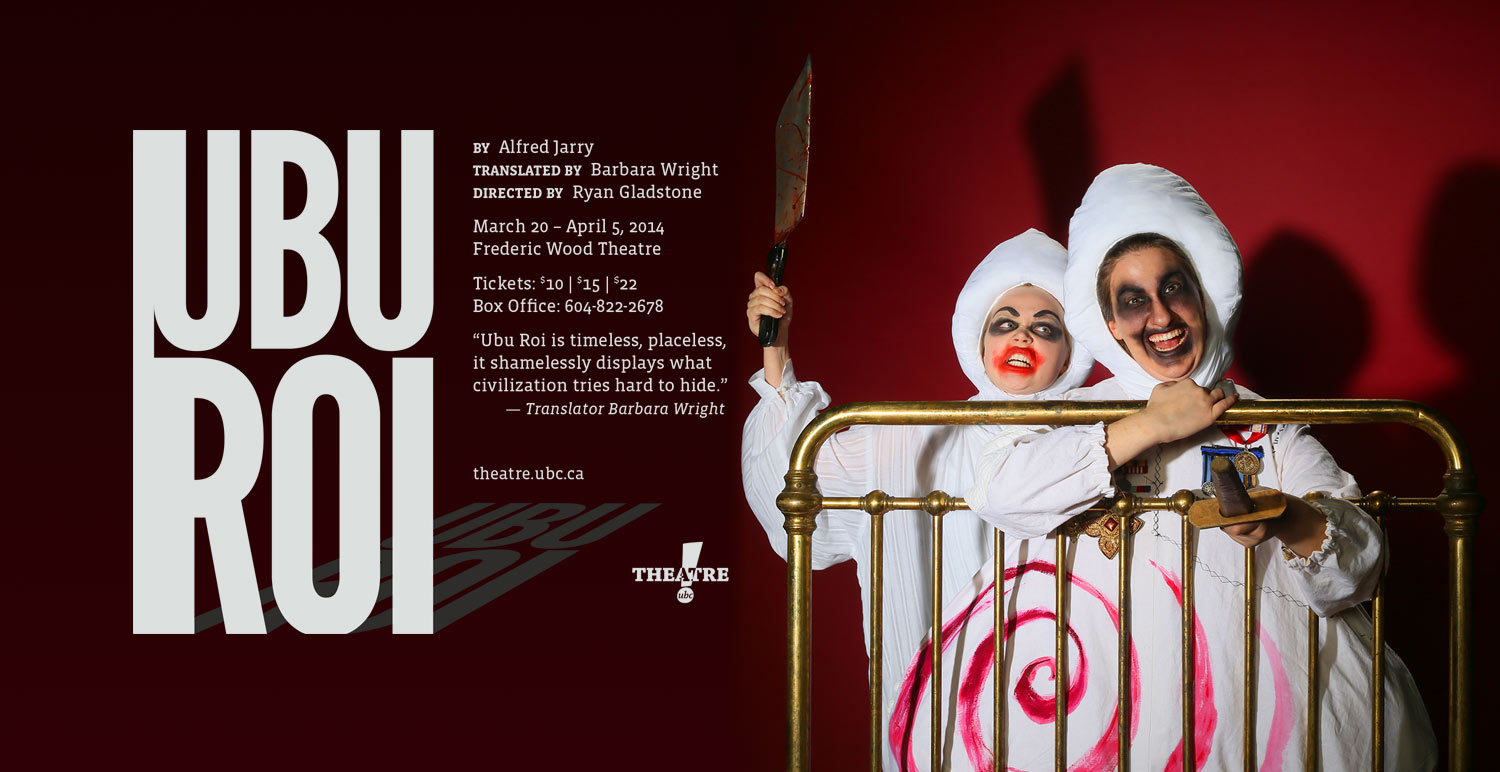 L-R: Sarah Harrison as Mere UBU, Naomi Vogt as Pere UBU. Photo Credit: Tim Matheson
L-R: Sarah Harrison as Mere UBU, Naomi Vogt as Pere UBU. Photo Credit: Tim Matheson
UBU ROI
By Alfred Jarry
Translated by Barbara Wright
Mar. 20 - Apr. 5, 2014
Presented by Theatre at UBC
Directed by Ryan Gladstone
Frederic Wood Theatre
6354 Crescent Rd.
UBC MAP: http://bit.ly/94dLm6
University of British Columbia
Vancouver CANADA
CURTAIN: 7:30 p.m.
TICKETS: Reg. $22/Senior $15/Student $10/Youth $2/
Groups $2 off ~ plus service charges
$7 Preview: Mar. 19
Talk Back: TBA
In 1896 with the first word of Ubu Roi, "Merdre!" (“Shitter!”), Jarry’s satire about greed and the abuse of power was outlawed for its scandalous language, violence and disrespect for authority. With resonances of Macbeth and unflinching humour, Ubu Roi was an inspiration to later absurdist playwrights and it remains a challenge to the comfortable and conventional. The play’s uninhibited tastelessness is practically sublime.
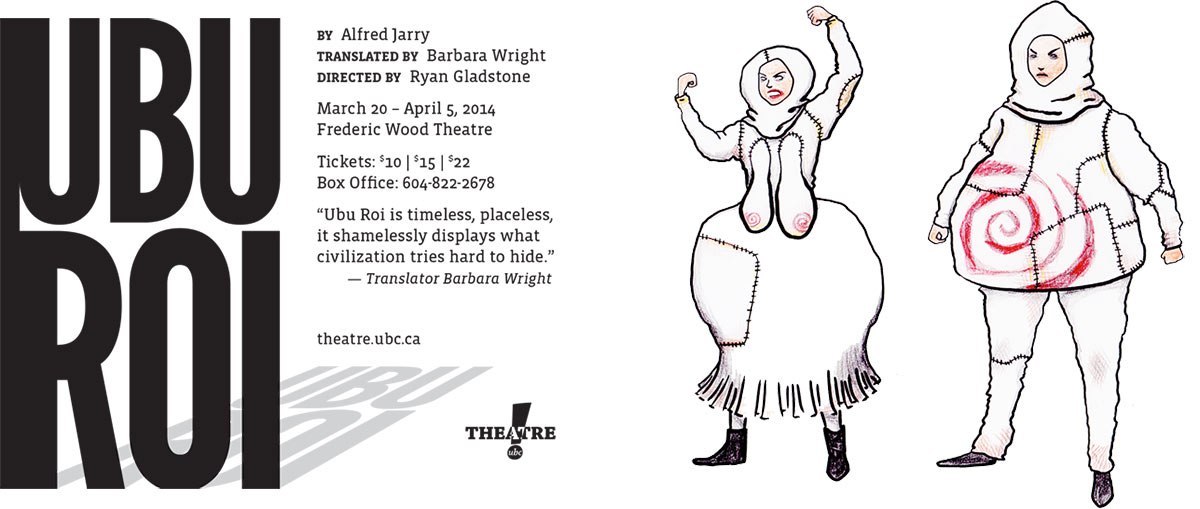
Costume design by Amelia Ross
WATCH! as our imbecile hero plots to kill the King
HEAR! Macbeth-ian machinations
SEE! Epic battles between the entire Russian and Polish armies!!
On its Paris premier in 1896 Alfred Jarry's UBU ROI provoked a 15 minute riot with it’s first word “Shitter!” and was instantly banned
UBU ROI unleashes a hilarious reign of comic terror at UBC: On its Paris premier in 1896 Alfred Jarry's UBU ROI provoked a 15 minute riot with it’s first word “Shitter!” and was instantly banned. UBU ROI is deservedly one of the theatre's most controversial plays, featuring some of its most unforgettable characters. The central figure, Pere UBU, is ridiculous, cruel, gluttonous, and grotesque—the author's metaphor for modern man. With resonances of Macbeth and unflinching humour, UBU ROI, is and an avant-garde foray into the nature of greed and power. An inspiration to later absurdist playwrights, it remains a startling challenge to the comfortable and conventional.
His best-known work, UBU ROI, is scandalous, surreal, and full of delightfully despicable characters
Playwright Alfred Jarry was a French playwright, poet, novelist, and journalist whose work prefigured Dadaism and the Theatre of the Absurd. His best-known work, UBU ROI, is scandalous, surreal, and full of delightfully despicable characters. After the play's debut, Jarry began to take on the persona of Pere Ubu, adopting increasingly bizarre behavior. He gained a cult following among younger artists of his day, becoming a hero to future luminaries including Guillaume Apollinaire and Pablo Picasso.
The masses don’t understand anything by themselves, but wait to be told how to see things.”
– Alfred Jarry
MFA Directing student Ryan Gladstone is founder and Artistic Director of Monster Theatre. He has created over 20 original plays for the company, selected credits include; Til Death: The Six Wives of Henry VIII, Assassinating Thomson, Lavinia and Houdini's Last Escape as a director; The Shakespeare Show, Freud vs his Ego, The Seven Lives of Louis Riel and The Canada Show as a writer; and No Tweed Too Tight, Hockey Night at the Puck & Pickle Pub, Every Story Ever Told and Napoleon's Secret Diary as a performer. Ryan has a BFA in acting from the University of Calgary. www.monstertheatre.com
UBU ROI stars BFA acting ensemble students Ghazal Azarbad, Sarah Canero, Morgan Churla, Lara Deglan, Catherine Fergusson, Sarah Harrison, Allyce Kranabetter, Jenna Mairs, Kat McLaughlin, Nicole Sekiya, Bethany Stanley, Cassandra Szabo, Naomi Vogt, Charlotte Wright, Natasha Zacher and Mercedes de la Zerda. The creative team includes BFA Design & Production students Sarah Melo (Set), Chengyan Boon (Lighting), Amelia Ross (Costumes) and Kate De Lorme (Sound) with Diane Chu (SM).
UBU ROI, By Alfred Jarry, Translated by Barbara Wright, Directed by Ryan Gladstone | Mar. 20 – Apr 5, 2014 | Frederic Wood Theatre, 6354 Crescent Rd., UBC MAP: http://bit.ly/1e03V89 CURTAIN: 7:30 pm | TICKETS: Reg. $22/Senior $15/Student $10/Youth $2/Groups $2 off ~ plus service charges | $7 Preview Mar. 19 |Talk Back: Wed. Mar 26 | BOX OFFICE: 604.822.2678 or box.office@ubc.ca Book Online: http://ubctheatre.universitytickets.com | MORE: www.theatre.ubc.ca
It is because the public are a mass – inert, obtuse and passive – that they need to be shaken up from time to time so that we can tell from their bear like grunts where they are – and also where they stand. They are pretty harmless in spite of their numbers, because they are fighting against intelligence.”
– Alfred Jarry
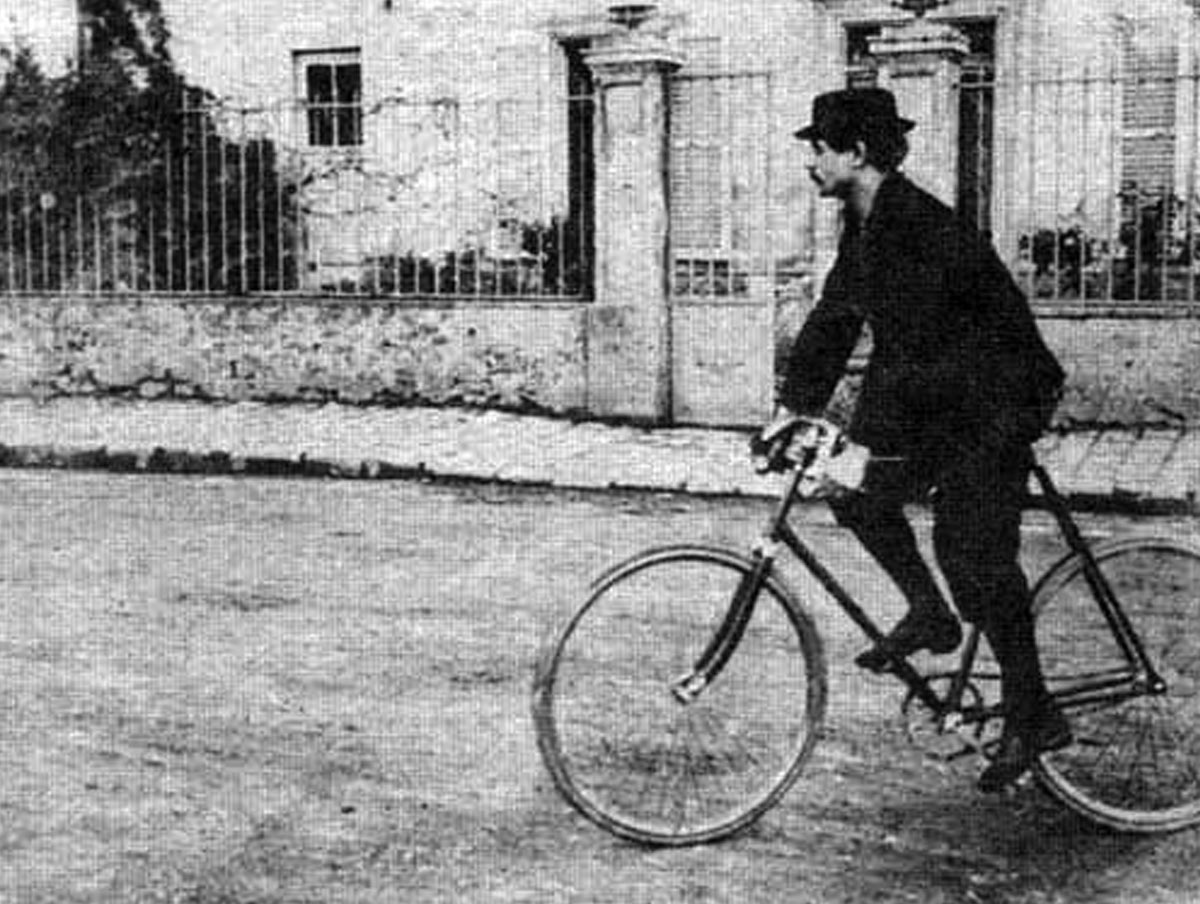
A precociously brilliant student, Jarry enthralled his classmates with a gift for pranks and troublemaking.
In Jarry's later work Ubu Roi, Père Heb would develop into Ubu, one of the most monstrous and astonishing characters in French literature.
At the lycée in Rennes when he was 15, he led a group of boys who devoted much time and energy to poking fun at their well-meaning, but obese and incompetent physics teacher, a man named Hébert. Jarry and classmate Henri Morin wrote a play they called Les Polonais and performed it with marionettes in the home of one of their friends. The main character, Père Heb, was a blunderer with a huge belly; three teeth (one of stone, one of iron, and one of wood); a single, retractable ear; and a misshapen body. In Jarry's later work Ubu Roi, Père Heb would develop into Ubu, one of the most monstrous and astonishing characters in French literature.
At 17 Jarry passed his baccalauréat and moved to Paris to prepare for admission to the École Normale Supérieure. Though he was not admitted, he soon gained attention for his original poems and prose-poems. A collection of his work, Les minutes de sable mémorial, was published in 1893.
That same year, both his parents died, leaving him a small inheritance which he quickly spent.
Jarry had meantime discovered the pleasures of alcohol, which he called "my sacred herb" or, when referring to absinthe, the "green goddess". A story is told that he once painted his face green and rode through town on his bicycle in its honour (and possibly under its influence).
The sight of the small man in a uniform much too large for his less than 5-foot frame—the army did not issue uniforms small enough—was so disruptively funny that he was excused from parades and marching drills
When he was drafted into the army in 1894, his gift for turning notions upside down defeated attempts to instill military discipline. The sight of the small man in a uniform much too large for his less than 5-foot frame—the army did not issue uniforms small enough—was so disruptively funny that he was excused from parades and marching drills. Eventually the army discharged him for medical reasons. His military experience eventually inspired the novel Days and Nights.
The spring of 1896 saw the publication, in Paul Fort's review Le Livre d'art, of Jarry's 5-act play Ubu Roi—the rewritten and expanded Les Polonais of his school days. Ubu Roi's savage humor and monstrous absurdity, unlike anything thus far performed in French theater, seemed unlikely to ever actually be performed on stage. However, impetuous theater director Aurélien-Marie Lugné-Poe took the risk, producing the play at his Théâtre de l'Oeuvre.
A quarter of an hour of pandemonium ensued: outraged cries, booing, and whistling by the offended parties, countered by cheers and applause by the more degenerate contingent.
On opening night (10 December 1896), with traditionalists and the avant-garde in the audience, King Ubu (played by Firmin Gémier) stepped forward and intoned the opening word, "Merdre!" (often translated as "Pshit" or "Shittr!" in English). A quarter of an hour of pandemonium ensued: outraged cries, booing, and whistling by the offended parties, countered by cheers and applause by the more degenerate contingent. Such interruptions continued through the evening. At the time, only the dress rehearsal and opening night performance were held, and the play was not revived until after Jarry's death.
Jarry would always speak in this style. He adopted Ubu's ridiculous and pedantic figures of speech; for example, he referred to himself using the royal we, and called the wind "that which blows" and the bicycle he rode everywhere "that which rolls".
The play brought fame to the 23-year-old Jarry, and he immersed himself in the fiction he had created. Gémier had modeled his portrayal of Ubu on Jarry's own staccato, nasal vocal delivery, which emphasized each syllable (even the silent ones). From then on, Jarry would always speak in this style. He adopted Ubu's ridiculous and pedantic figures of speech; for example, he referred to himself using the royal we, and called the wind "that which blows" and the bicycle he rode everywhere "that which rolls".
Jarry moved into a flat which the landlord had created through the unusual expedient of subdividing a larger flat by means of a horizontal rather than a vertical partition. The diminutive Jarry could just manage to stand up in the place, but guests had to bend or crouch. Jarry also took to carrying a loaded revolver. In response to a neighbor's complaint that his target shooting endangered her children, he replied, "If that should ever happen, ma-da-me, we should ourselves be happy to get new ones with you".
With Franc-Nohain and Claude Terrasse, he co-founded the Théatre des Pantins, which in 1898 was the site of marionette performances of Ubu Roi.
In his final years, he was a legendary and heroic figure to some of the young writers and artists in Paris. After his death, Pablo Picasso, fascinated with Jarry, acquired his revolver and wore it on his nocturnal expeditions in Paris, and later bought many of his manuscripts as well as executing a fine drawing of him.
It is recorded that his last request was for a toothpick
Jarry lived in his 'pataphysical world' until his death in Paris on 1 November 1907 of tuberculosis, aggravated by drug and alcohol use. It is recorded that his last request was for a toothpick. He was interred in the Cimetière de Bagneux, near Paris.
Source: wikipedia.org
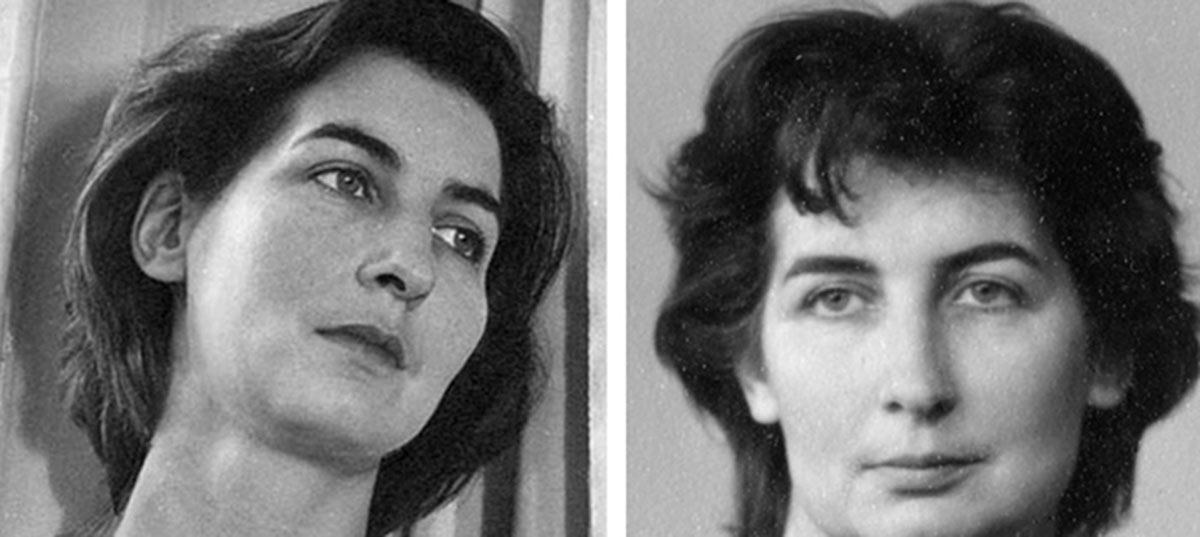
Barbara Wright was an exceptional translator who was at the forefront in introducing the "New French Novels" of the 20th century to the British public. She translated works by figures such as Samuel Beckett, Robert Pinget, Marguerite Duras, Jean Genet and Eugene Ionesco, and was twice awarded the Scott Moncrieff prize: in 1987 for her translation of Pierre Albert-Birot's The First Book of Grabinoulor, and in 1992 for The Midnight Love Feast by Michel Tournier.
The English edition of Ubu Roi, which came out in 1951, was a work of art in itself.
The English edition of Ubu Roi, which came out in 1951, was a work of art in itself. Wright's handwritten text, interspersed with Franciszka Themerson's humorous illustrations, were both incised directly on to the lithographic plates and printed on startling yellow paper. Ubu's opening word, "Merdre!", was translated by Wright as "Shittr!"
'talking about things that are understandable only weighs down the mind and falsifies the memory, but the absurd exercises the mind and makes the memory work'. – Alfred Jarry
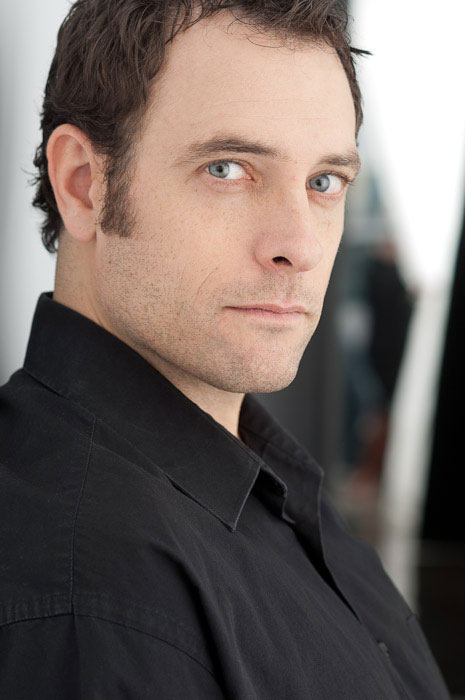
MFA Directing student Ryan Gladstone is founder and Artistic Director of Monster Theatre. He has created over 20 original plays for the company, selected credits include; Til Death: The Six Wives of Henry VIII, Assassinating Thomson, Lavinia and Houdini's Last Escape as a director; The Shakespeare Show, Freud vs his Ego, The Seven Lives of Louis Riel and The Canada Show as a writer; and No Tweed Too Tight, Hockey Night at the Puck & Pickle Pub, Every Story Ever Told and Napoleon's Secret Diary as a performer.
Ryan has a BFA in acting from the University of Calgary.
When Ubu Roi premiered in Paris in 1896, Jarry had a clear vision of what he wanted to accomplish. Jarry’s vision lasted for precisely one word, Merdre (Shitter). The audience erupted in outrage at the first word of the play and the performers couldn’t continue for over 20 minutes, eventually they abandoned Jarry’s staging and started bounding about in an overtly comic style that the audience recognized from Music Hall or other ‘low’ theatre and allowed them to continue, though outbursts continued every time Shitter was spoken (a total of 33 times). Ubu was never again performed in Jarry’s lifetime.What this means is that there is not, nor has ever been a correct way to perform Ubu Roi.
To laugh at such absurd forms of humour, requires a willingness to suspend the normal habits of rational thinking characteristic of the adult mind, and to enter once again, at least momentarily, into the spirit of childhood.
– Keith Beaumont
The first version of Ubu was conceived over a decade earlier when Jarry was only 14 years old attending boarding school where there was a long tradition of students inventing fictions based on their longsuffering physics teacher Felix Hebert, or Père Heb who was “…physically grotesque, flabby and pig-like, lacked all dignity and authority, and had been the butt of schoolboy humour for years before Jarry’s arrival at Rennes.” (Barbara Wright). Up until this point none of these tales had been acted out, until Jarry, along with Charles and Henry Morin, secretly performed a marionette version in Jarry’s attic of Les Polonais (The Poles), the precursor to Ubu Roi. Ubu Roi “…could never have come into existence without the vast and shapeless mass of schoolboy legend and fantasy...Ubu Roi is the fruit of a collective schoolboy imagination, an authentic product of a collective, ‘primitive’ creativity…” (Keith Beaumont). I have taken ample inspiration from Ubu’s origin.
We too shall become solemn, fat and Ubu-like and shall publish extremely classical books which will probably lead to our becoming mayors of small towns where, when we become academicians, the firemen will present us with Sevres vases, while they present their moustaches on velvet cushions to our children. And another lot of young people will appear, and consider us completely out of date, and they will write ballads to express their loathing of us, and there is no reasons why this should ever end.
– Alfred Jarry
I have seen other versions of this play and something always stood out to me as wrong. It is true that this play is the precursor to later absurdist works, but such a school didn’t exist in Jarry’s time, he was inventing it. If the story takes place in a world that is not taken seriously, people can die without being harmed, or people talk funny, or are basically inhuman and unaltered by events that happen to them, then the stakes of the story disappear. I always saw Ubu as a heroic Shakespearean tragedy that happened to take place in a world so strange that someone like Ubu could become King. So, I tasked myself to create a universe where all these things could happen, generate the specific laws of that universe, and then ask the actors to exist 100% truthfully within that universe.
It’s been a wild ride trying to tame this beast of a play. With the exceptional collaboration of the designers and the actors I think we have created something that finds a way to recreate some the shock of the original, that is true to the adolescent playfulness of the precursor and tells the story of Ubu in a fun and exciting way.